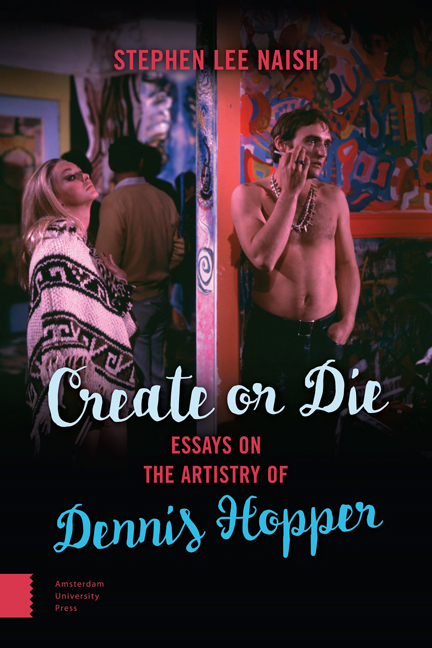Book contents
- Fronmatter
- Dedication
- Contents
- Introduction
- Scenes from a Revolutionary Life: How Dennis Hopper Conquered the American Century
- Hip-Hopp: Dennis Hopper and Music
- The Elephant in the Room: Dennis Hopper and American Politics
- Love and Hate: The Conflict of Emotions in The Blackout and Carried Away
- Commercial Breakdown: Dennis Hopper in the World of Advertisements
- White Light/White Heat: Actor and Character Collide in White Star
- Double Standards: The Art and Photography of Dennis Hopper
- Coda: The Fourth Wall
- Acknowledgements
- Notes
- Bibliography
Hip-Hopp: Dennis Hopper and Music
Published online by Cambridge University Press: 11 December 2020
- Fronmatter
- Dedication
- Contents
- Introduction
- Scenes from a Revolutionary Life: How Dennis Hopper Conquered the American Century
- Hip-Hopp: Dennis Hopper and Music
- The Elephant in the Room: Dennis Hopper and American Politics
- Love and Hate: The Conflict of Emotions in The Blackout and Carried Away
- Commercial Breakdown: Dennis Hopper in the World of Advertisements
- White Light/White Heat: Actor and Character Collide in White Star
- Double Standards: The Art and Photography of Dennis Hopper
- Coda: The Fourth Wall
- Acknowledgements
- Notes
- Bibliography
Summary
Dennis Hopper's relationship with and knowledge of contemporary music greatly influenced his career as a film director. It is important to consider this aspect in order to understand his importance and influence in film and popular culture. Hopper's use of music within his own directorial films placed within them cultural markers that offered commentary on the fictional narratives of the film and the factual events that surround the era in which the film was made. When Hopper incorporated 1960s rock and folk songs into the soundtrack of Easy Rider's jaunt across America, they not only provided an entertaining visual and aural experience, they also presented additional significance to the narrative—though in some respects the significance was accidental, as Hopper admitted: “It took me a year to edit it. I would play the radio on the way to the editing room and I would hear the music off the radio. And as I was doing the travelling sequences I started putting songs to it.” Originally, the soundtrack was to be scored by folk-rock superstars Crosby, Stills & Nash. However, according to Hopper, the band’s ethos didn't correspond with his own and that of his film:
The original idea was for Crosby, Stills & Nash to score Easy Rider, but I had a falling out with Stephen Stills. We were driving back to my office in his limo and I said, “Stephen, this simply isn't going to work.” He asked why and I shouted, “Because I’ve never been in a limo before and anyone who drives around town in a limo can't understand my movie! Fuck off!”
This dramatic disagreement led Easy Rider to become a milestone in film sound-tracking. Before Easy Rider, it was virtually unheard of for a movie to use already recorded and released music by popular bands and singers on a soundtrack. Prior to Easy Rider, the norm for a film soundtrack was for it to be scored by composers or session musicians after an initial edit of the movie was available. As the 1960s progressed, a number of films featured original folk rock scores recorded predominantly by one artist. In the case of The Graduate (1967), folk duo Simon & Garfunkel provided original compositions that made up the bulk of the soundtrack material.
- Type
- Chapter
- Information
- Create or DieEssays on the Artistry of Dennis Hopper, pp. 41 - 50Publisher: Amsterdam University PressPrint publication year: 2016

